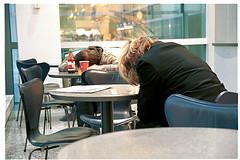 Jet lag is one of the great scourges of international travel – it can knock you for a loop when you cross multiple time zones. Typically, you just deal with it and get over it in a couple of days.
Jet lag is one of the great scourges of international travel – it can knock you for a loop when you cross multiple time zones. Typically, you just deal with it and get over it in a couple of days.
Now, a new study from Europe gives us some more understanding about jet lag, including the notion that jet lag really doesn’t have anything to do with traveling. Rather, it’s about screwing up your body clock and sleeping at the wrong times. When you think about it, this makes sense – we already knew that it isn’t the traveling piece of the equation that was making you feel so out of sorts; it’s the fact that suddenly your circadian rhythms are out of whack and your body thinks that it’s 2 a.m. when you’re out on the street, looking for a late breakfast.
So, yes it’s possible to be jet-lagged when you aren’t even traveling if you don’t have a relatively set sleep schedule. Researchers at the University of Munich call it “social jet lag” and – this is important – say that messing with your sleep rhythms is a contributing factor to obesity. The researchers say chronically sleep-deprived people are more likely to overeat and drink alcohol and caffeine.
And so, if you’re a frequent traveler, this new study is one more reason to pay extra attention to getting the proper rest when you’re on the road. Here are some tips for combatting jet lag, whether you’re on the road or just chilling at home:
- Have a regular bedtime. You should go to sleep and wake up at roughly the same time each day. When traveling across five or six time zones, this might not be possible, but you should try to sync them up as closely as possible. This does not mean you need to excuse yourself for the evening at 4 in the afternoon in London.
- Work up to it. Get up and go to bed earlier several days before an eastward trip. Get up and go to bed later for a westward trip.
- Drink plenty of liquids, preferably water, during the flight.
- Stay away from excessive caffeine, alcohol and tobacco on the flight and during your stay.
- Get some sun. Spending time outside at your destination will help reset your internal clock.
- Get some exercise. Even a quick 20 minute workout during the day will help you sleep at night. Just make sure it’s at least five hours before you hit the sack.
Photo by Gin Fizz.

